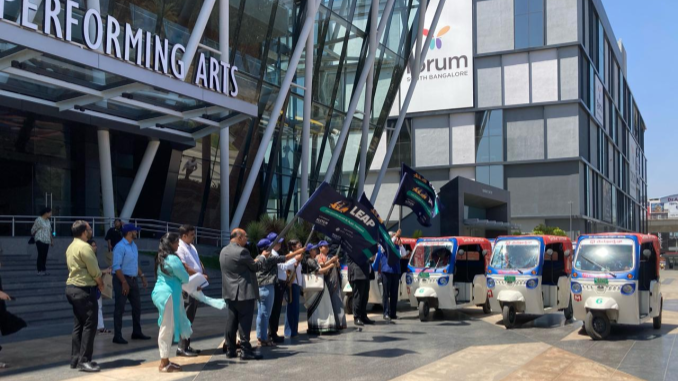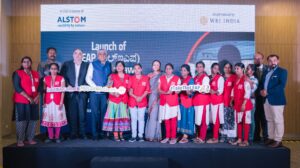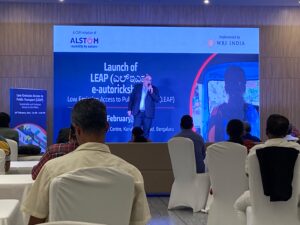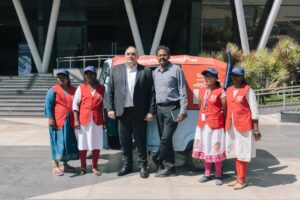
Alstom, a global leader in smart and sustainable mobility, has introduced Low Emission Access to Public Transport (LEAP), a program under its Corporate Social Responsibility initiative, that aims to boost last-mile connectivity, encouraging greater public transport usage.

More Details:
As part of the pilot phase of the program, MetroRide will have electric auto rickshaws deployed as last-mile service from Yelachenahalli and Indiranagar stations of the Namma Metro in Bengaluru. As a step to encourage and include women in the urban mobility landscape, MetroRide, an AI-powered EV ride hailing solution for daily commuters, has trained around 25 women drivers to drive the electric rickshaws in the said region. The rides can be booked through the MetroRide app.

The program was inaugurated by Mr. Olivier Loison, Managing Director, Alstom India, Mr. Srinivas Alavilli, Fellow, WRI India, Mr. Rajeev Gowda Vice Chairman, State Institute for the Transformation of Karnataka, and Smt. Kalpana Kataria, Executive Director (Connectivity & Asset Management), Bangalore Metro Rail Corporation Limited.
Significance of the Initiative:
- Bengaluru is one of the world’s most congested cities and has the highest number of private cars in India. While the metro service has rapidly expanded over the years, a recent WRI India survey has revealed that 70% of commuters were deterred by poor last-mile connectivity to Bengaluru Metro.
- Women, constituting only a fraction of metro commuters, face additional challenges due to unsafe or inconvenient last-mile connections and chronic underrepresentation in the male-dominated transport workforce.
- LEAP aims to address these concerns by not only improving access to Bengaluru Metro for women but also actively contributing to enhancing women’s participation in the transport workforce as drivers, fostering a more inclusive and sustainable urban mobility landscape.

Expert Insights:
Mr. Olivier Loison, Managing Director, Alstom India said, “Namma Metro will play a significant role in easing the on-road movement challenges in Bengaluru and as leaders in sustainable mobility, there could be no better way for us to encourage public transport than LEAP. Through our partnership with WRI India and leveraging the innovations brought to the table by an Alstom-mentored startup, MetroRide, we have taken a noteworthy step in bridging the last mile connectivity challenge with this program. Together, we’ll leverage innovation and expertise to implement solutions that elevate the metro experience, making it more accessible, efficient, and environmentally friendly”.
Mr. Srinivas Alavilli, Fellow, WRI India said, “Our collaboration with Alstom and MetroRide is founded on a commitment to data-driven decision-making in public transport. Addressing the critical last-mile connectivity gap prevalent in India’s metro networks, our joint efforts aim to provide commuters with a safe, low-cost, and low-emission mode of transport within the city. Beyond revolutionising the daily commute, LEAP is dedicated to fostering sustainable livelihoods, particularly for our women driver partners. This initiative not only bridges gaps in urban mobility but also propels a socio-economic shift, underscoring our commitment to creating positive and lasting impact in the communities we serve.”
WRI role in LEAP’s Success:
- WRI India’s pivotal role in LEAP’s success includes conducting detailed commuter surveys, as well as facilitating focus group discussions with both commuters and auto drivers.
- Their ongoing support also extends to working in close collaboration with MetroRide to design and test LEAP’s operating model, evaluating the service’s progress, and analysing insights, which helps contribute to the project’s data-driven approach and overall effectiveness.

Alstom Commitment:
- Alstom’s commitment to sustainable mobility extends beyond LEAP, with strategic investments in initiatives like the Sustainability Incubation Program in partnership with NRSCEL, IIM Bangalore. This program nurtures startups dedicated to combating climate change and addressing sustainability challenges in mobility.
Future Prospects:
LEAP’s success in Bengaluru is poised to pave the way for its expansion to other metro stations, promising to increase metro ridership by providing seamless connectivity to high-frequency hubs. Alstom’s proactive approach towards addressing last-mile connectivity issues aligns with its broader goal of advancing sustainable mobility in India.
Conclusion:
Alstom’s LEAP program represents a significant milestone in the journey towards sustainable urban mobility in Bengaluru. By fostering innovation, collaboration, and inclusivity, LEAP is poised to transform the way commuters access public transport, laying the foundation for a greener, more efficient transportation ecosystem.
Source: Alstom- Press Release | Images Credit: Alstom

